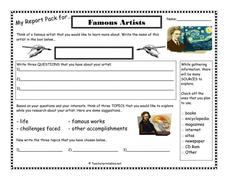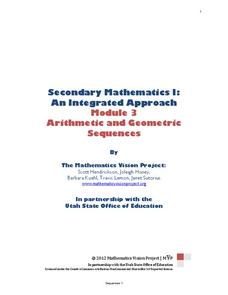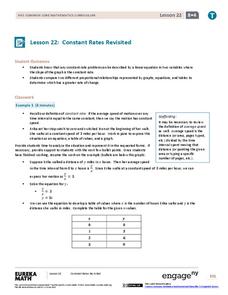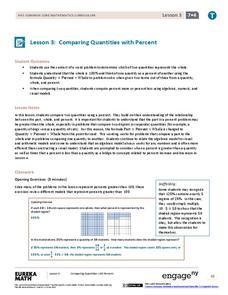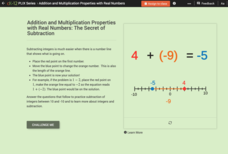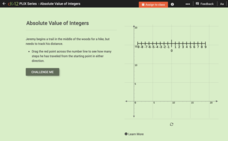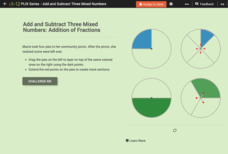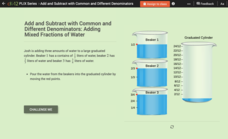American Chemical Society
Exploring Baking Powder
Meant to follow an activity in which young chemists identified an unknown substance by chemical reactions, they now take their data and use it to determine which materials combine to make up baking powder. This lesson is one that can be...
Teacher Printables
My Report Pack for... Famous Artists
Famous artists are fascinating, and learners will explore one of their choice using this report pack. Working their way through this template, they write three questions about the artist they are researching, check off types of reference...
Ginger Labs
Notability
You'll want to take note of this app! Create custom notes that you can use to present and record information. Use the formatting options to make your notes look great, and the sharing options to keep your class up to date!
Mathematics Vision Project
Module 3: Arithmetic and Geometric Sequences
Natural human interest in patterns and algebraic study of function notation are linked in this introductory unit on the properties of sequences. Once presented with a pattern or situation, the class works through how to justify...
Learning for Life
Overcoming Poor Decisions
Help your learners develop the ability to recognize poor decisions, make necessary changes, and learn valuable lessons from their mistakes through scenario analysis and discussion with their peers.
American Chemical Society
Molecules Matter
Did you know that jumping spiders sometimes wear water droplets as hats? A seventh grade science activity introduces the concept of what makes up water: tiny molecules that are attracted to each other. Starting with a chemistry...
Illustrative Mathematics
Identifying Graphs of Functions
Take a matching problem and take challenging exponential graphs and combine to make one thought-provoking question. Learners look at four higher level exponential functions to match to the four graphs placed together. The equations and...
EngageNY
Motion Along a Line – Search Robots Again
We can mathematically model the path of a robot. Learners use parametric equations to find the location of a robot at a given time. They compare the paths of multiple robots looking for parallel and perpendicular relationships and...
Virginia Department of Education
Biotechnological Issues and Bioethics
Culminate a bioethics unit with the implementation of a lesson that incorporates the Socratic method to encourage class feedback and participation. Pupils participate in a discussion on bioethics and morality, complete a writing seminar,...
EngageNY
Constant Rates Revisited
Find the faster rate. The resource tasks the class to compare proportional relationships represented in different ways. Pupils find the slope of the proportional relationships to determine the constant rates. They then analyze the rates...
EngageNY
Comparing Quantities with Percent
Be 100 percent confident who has the most and by how much. Pupils use percentages to help make the comparisons by finding what percent one quantity is of the other. They also determine the percent differences between the two quantities.
Towson University
Mystery Tubes
How do scientists know they're right? Truth be told, they don't always know. Explore the scientific process using mystery tubes in an insightful activity. Young scientists discover how to approach and solve problems in science, how ideas...
CK-12 Foundation
Stratified Random Sampling: An Extracurricular Study
Learning isn't a random process. A well-designed interactive lesson helps classes make key conclusions about stratified random sampling. They calculate group percentages and use those percentages to decide on sampling totals.
Chemistry Collective
Virtual Lab: Cobalt Chloride and Le Chatelier’s Principle
Colorful cobalt complexes make a great way to learn about Le Chatelier! Eager chemists explore equilibrium through a virtual lab. Individuals use solutions with two different concentrations and observe the color changes that indicate...
Advocates for Youth
How Can I Take Care of My Health?
Life is all about choices, and a healthy life tends to involve a lot of healthy choices. Guide teenagers toward a life full of nutritious food, regular exercise, and responsible decisions with a series of lessons on healthy habits for...
Teach It Primary
The Pied Piper of Hamelin
Six tasks make up a lesson plan designed to reinforce comprehension and language skills using the poem "The Pied Piper" by Robert Browing. Scholars discuss and define unknown words, identify adjectives and onomatopoeia, review complex...
Reed Novel Studies
The One and Only Ivan: Novel Study
A new friend, a new perspective, and a new light are all found in Katherine Applegate's The One and Only Ivan. Ivan, a gorilla, was content with his life until a baby elephant befriended him. Readers find synonyms, answer comprehension...
CK-12 Foundation
Addition and Multiplication Properties with Real Numbers: The Secret of Subtraction
An interactive boosts mathematicians' knowledge of subtracting integers using a horizontal number line by way of multiple-choice, true or false, and discussion questions.
CK-12 Foundation
Absolute Values of Integers
A five-question interactive focuses on integers and absolute value. A number line shows the distance to aide mathematicians in answering multiple-choice, true or false, and discussion questions.
CK-12 Foundation
Addition of Fractions
Five word-problems challenge mathematicians to add fractions. Interactive fraction circles assist scholars in problem-solving. Question types include multiple-choice, true or false, and a discussion.
CK-12 Foundation
Numbers with Decimal Place Value: Battleship Decimals
Decimal place value is the topic of a Battleship themed-interactive. Scholars answer five questions—multiple-choice and true or false—while referencing a grid that acts as the board game. The practice concludes with a discussion question.
CK-12 Foundation
Decimal Rounding Given Place Value
Tests mathematicians' knowledge of decimals, place value, and rounding with a five-question interactive. A tool with movable parts assists scholars in answering questions—multiple-choice and true or false. A discussion question...
CK-12 Foundation
Subtraction of Fractions: Fragmented Fractions
An interactive challenges scholars to subtract mixed numbers. Pupils answer questions—multiple-choice, fill in the blank, and true or false—with help from virtual fraction strips. The practice closes with a discussion.
CK-12 Foundation
Expression Evaluation with Different Denominators: Adding Mixed Fractions of Water
An interactive challenges mathematicians to add mixed fractions with unlike denominators. Five questions—fill-in-the-blank and multiple-choice—build from one to the next leading the way to an open discussion about denominators and...
Other popular searches
- Making Change Worksheets
- Adding Money Making Change
- Making Change Lesson
- Money Making Change
- Making Change Math Center
- Real Life Math Making Change
- Money Shopping Making Change
- Making Change From $1
- Making Change From $1.00
- Making Change Counting Up
- Money and Making Change
- Canadian Money Making Change



